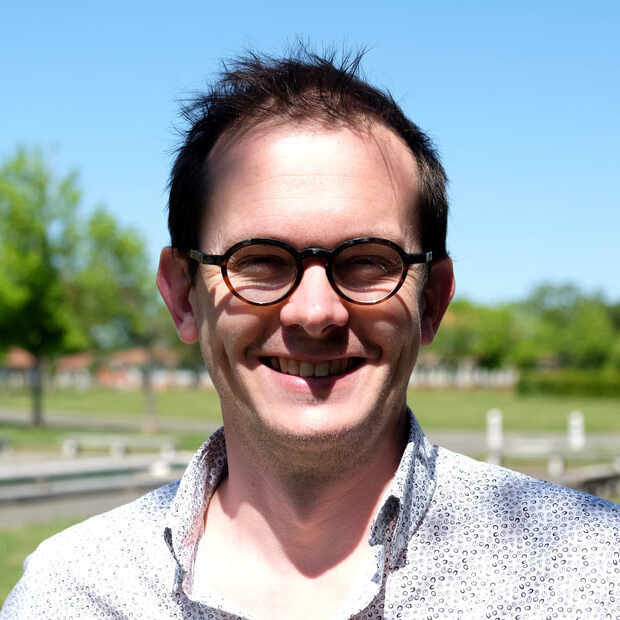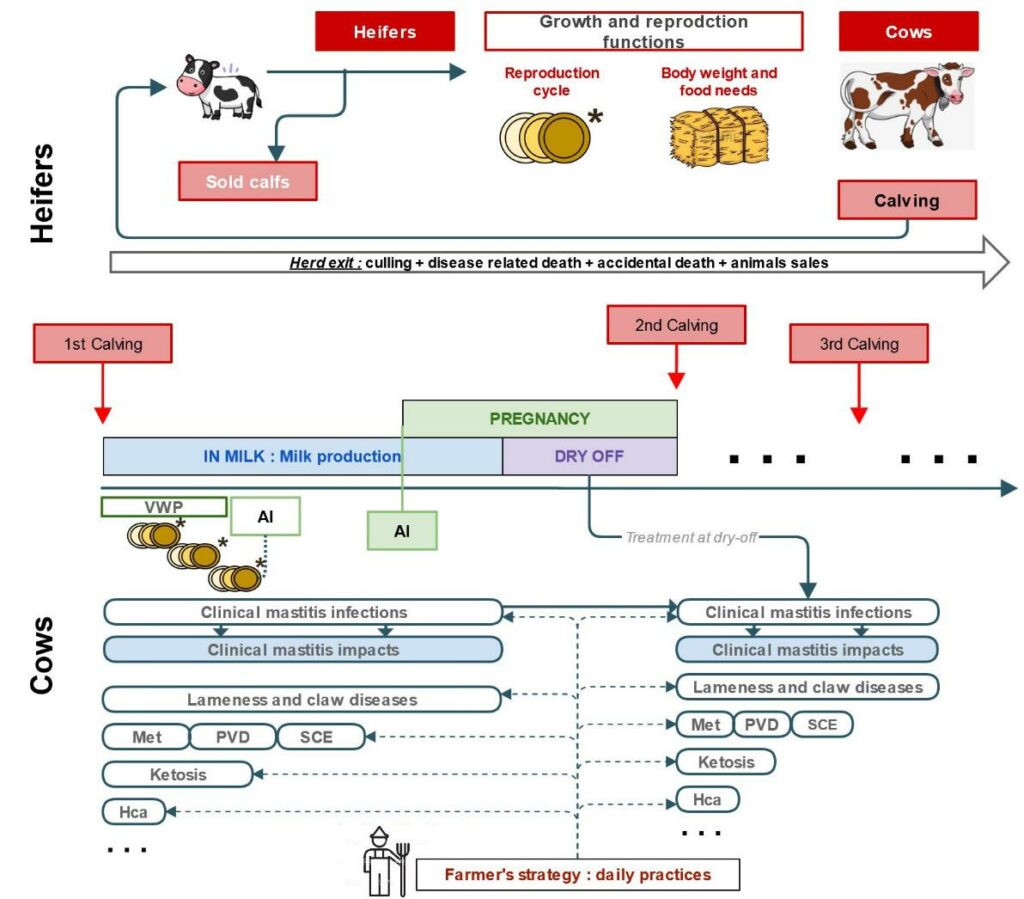
Didier Raboisson
DVM, MSc, PhD, dipl. ECBHM, HDR
Professor in
Ruminant Population Medicine and Animal Health Economics
didier.raboisson@envt.fr
+33 (0)5 61 19 32 30
Biography
Didier Raboisson is full professor in Toulouse Veterinary School, France.
He graduated from Toulouse Veterinary School in 2004, worked in the field for 2 years and came back to the university as lecturer. He is Diplomate of the European College of Bovine Health Management (ECBHM) since 2011. He holds a MSc in Agriculture Science and Socio-economics (2007) and defended his PhD in Institutional Economics in 2011 (University of Toulouse).
Prof. Raboisson published more than 75 international peer-reviewed papers and 82 professional papers. He gave 90 international conferences and was the supervisor of 8 phD students and 6 post-doctorates. He was involved in 29 international research projects and led 8 of them as principal investigator.
He is currently leading the research group VetEconomics and a French continuous training programme in bovine population medicine.
Prof. Raboisson previously led the French research network ERIAH– Economics Reasoning for Improved Animal Health, acted as secretary of ISESSAH –the International Society for Economics and Social Sciences applied to Animal Health, and actively contributed to veterinary digital innovation and teaching (registered patent DHS® and App Qost®). He is actively involved in GBADs – Global Burden Animal Diseases
Research interests
Didier did his PhD on cattle health using institutional economics concepts. He focused on collective organisation and on their impact on production and heath performances (farmer behaviour). It included a work on large exhaustive spatialized database describing animals’ mortality and milk production performances. Then, he developed empirical analysis of diseases costs (ketosis, reproduction performances and newborn diseases), and included the results in a global framework where these costs are considered as intermediary data for economic reasoning (economics for decision making). Recent developments are focused on original bioeconomic stochastic dynamic optimisation modelling of dairy herds that allow to optimise the farmer utility under various constraints. This allows to go beyond most of the model currently used in economics of animal health. The model is applied to the antimicrobial use in dairy farming. Didier is also interested in the analyses of the business model of the French vet offices.
Prof. Raboisson defended his PhD in institutional economics applied to cattle health in 2011. This work focused on collective organisations and on their impact on production and heath performances. It highlighted how farmer behaviour may influence disease control, including epidemic diseases such as Blue Tongue virus.
Prof. Raboisson developed many empirical analysis of disease costs (ketosis, reproduction performances and newborn diseases) showing the limitations of methods used worldwide in the early 2000’s. To fix this concern, he developed DairyHealthSimulator®, a new stochastic dynamic model applied to dairy herd that was coupled with an optimization economic function to create a new generation of bio-economic modelling approach. Applied to mastitis, lame and reproduction, the model identified optimal strategies considering at a glance income, labor, welfare and other externalities such antimicrobial use.
Another activity is the study of the veterinary shortage in France. Thanks to qualitative and quantitative approaches, he provided a better description of veterinary shortage in France and its determinants. He also demonstrated how the different veterinarian activities contributes to the veterinarians’ income (business model of the French vet offices).
Recent work on the application of the loss envelop concept (GBADs) in different international fields aims at better describing the spatio-temporal changes in the total cost of diseases.
The research work of Prof Raboisson takes place internationally in many fields (France, EU, North America and India), and includes cooperations with many institutions (Cornell, Liverpool, Calgary, Blida…).
Key Picture

Teaching duties
Didier’s teaching activities focus on cattle production systems and technics, bovine population medicine and economics of animal health. Early in the curriculum, his teaching focuses on general and transversal knowledge and knowhow applied to livestock systems and production technologies and practices (milking, housing, welfare, animal scoring, farm data mining and dashboard indicators interpretation). Clinical population health is taught on farm around real cases of herd health issues (problem solving). Economics of animal health includes finishing and continuous training on economics reasoning and on the practical use of economics in the field for improved decision making. Didier has also developed numeric tools, including a dairy herd simulator to improve online teaching of disease free herd dynamics and diseases impacts.
Prof. Raboisson’s teachings focus on bovine population medicine and economics of animal health.
In-farm population medicine teaching is based on herd-level health disorders problem solving, using the DODforD approach: this method gathers clinical observations of animals and herd data-based indicators to identify health and production issues and to provide solutions for farmers. He performed up to 30 global herd visits per year and developed cattle population telemedicine for the follow-up of the in-person visits and for remote clinical herd-level diagnosis.
Teaching of Economics of animal health includes courses in the veterinary curricula as well as in continuous training of vets. It focuses on economics reasoning and the practical use of economics in the field for improved decision making.
Prof. Raboisson is also deeply involved in French professional veterinary journals (members of Bulletin des GTV and scientific editor of Le nouveau praticien Elevage et Santé) and in French professional associations (SNGTV).
Publications
Key recent publications
- Berrada M, Raboisson D, Lhermie G. Effectiveness of rural internships for veterinary students to combat veterinary workforce shortages in rural areas. PLoS One. 2024 Mar 7;19(3):e0294651. doi:10.1371/journal.pone.0294651. eCollection 2024. PMID: 38451938 Free article.
- Sucena Afonso J, El Tholth M, Mcintyre KM, Carmo LP, Coyne L, Manriquez D, Raboisson D, Lhermie G, Rushton J. Strategies to reduce antimicrobials in livestock and aquaculture, and their impact under field conditions: a structured scoping literature review. J Antimicrob Chemother. 2024 Jan 3;79(1):11-26. doi:10.1093/jac/dkad350. PMID: 37950886 Free PMC article.
- Robcis R, Ferchiou A, Berrada M, Ndiaye Y, Herman N, Lhermie G, Raboisson D. Cost of lameness in dairy herds: An integrated bioeconomic modeling approach. J Dairy Sci. 2023 Apr;106(4):2519-2534. doi: 10.3168/jds.2022-22446. Epub 2023 Mar 7. PMID: 36894430 Free article.
- Dervillé M, Manriquez D, Dorin B, Aubron C & Raboisson D. Indian dairy cooperative development: A combination of scaling up and scaling out producing a center-periphery structure. World Development, Volume 170, 2023, 106249, ISSN 0305-750X, doi : 10.1016/j.worlddev.2023.106249.
- Manriquez D, Costa M, Ferchiou A, Raboisson D, Lhermie G. Multi-Criteria Decision Analysis for Assessing Social Acceptance of Strategies to Reduce Antimicrobial Use in the French Dairy Industry. Antibiotics (Basel). 2022 Dec 21;12(1):8. doi: 10.3390/antibiotics12010008. PMID: 36671209 Free PMC article.
- Lhermie G, Ndiaye Y, Rushton J, Raboisson D. Economic evaluation of antimicrobial use practices in animal agriculture: a case of poultry farming. JAC Antimicrob Resist. 2022 Dec 21;4(6):dlac119. doi: 10.1093/jacamr/dlac119. eCollection 2022 Dec. PMID: 36570685 Free PMC article.
- Dervillé M, Dorin B, Jenin L, Raboisson D & Aubron C. Inclusiveness of the Indian Dairy Sector: An Institutional Approach. Journal of Economic Issues Pages 994-1017 | Published online: 01 Sep 2023 doi: 10.1080/00213624.2023.2240182
Resume
Diploma
2017: HDR, the French accreditation for research directorate
2011: PhD “An institutional economic approach of animal health: the place of competencies, territories and collective actions in bovine health management”
2011: Diplomate of the European College of Bovine Health Management
2007: MSc in Economics applied to rural questions
2005: Internship in clinics for ruminants at the Ecole Nationale Vétérinaire de Toulouse (ENVT)
2003: Doctor in Veterinary Medicine
Functions
2019- : Full professor at the ENVT
2012-2019: Associate professor at the ENVT
2006-2011: Contractual assistant for teaching and research at the ENVT
Main scientific responsabilities
Since 2019: Head of the continuous training programme in Bovine Population Medicine
Since 2020: Leader of the research unit group VetEconomics (8 researchers)
2018- 2020: Head of the research unit team Epidemiology and Economics
2016- 2020: Lead of the French research network ERIAH
2016- 2020 : Member of the Committee for Veterinary Drug of the ANSES
Since 2018 : Academic editor for PlosOne and Frontiers in Veterinary Sciences
2018- 2022: Secretary of the ISESSAH
2018: Scientific head of ISESSAH Annual Conference
Main institutional working group and audition
Auditions by CGAAER: Value share in the French official animal heath control system (2023) ; Economics of the management of official disease control (2017)
Ministerial working group DGAL: Biosecurity and bovine tuberculosis (2018-2021) ; the veterinary shortage in France (2017-2019)
Expert in the following projects: economic evaluation of PPR (FAO 2019), international analysis of the veterinary drug market (WHO 2020-2021), 2 legal assessments (2020), 5 scientific assessments for defining the economic strategy related to new veterinary drugs, economic management of drugs in the field and veterinary market analysis
Main research programme
2013-2020: Work-package leader of 3 different research programs of INRAE (200 k€)
2012-2020: Lead of 5 private research programs with pharmaceutical firms (250 k€)
2017-2021: Lead of 5 research program on economic optimisation (520 k€) from Ministry for Agricultural Sovereignty
2017-2024: Lead and Contributor of4 projects funded by ANR or EU (H2020) (450 k€)
Stay at Embassy of France in India as Attaché for Scientific Cooperation
Four missions:
- Support of the Indo-French Center for Promotion of Advanced Research (CEFIPRA);
- Definition and implementation of the pluri-annual plan for the Indo-French scientific cooperation;
- Support of the indo-French cooperation in the domain of health;
- Scientific diplomacy with GoI.
Four key contributions:
- Implementation of the Indo-French Campus in the field of life science for Health;
- Indo-French Joint Science and Technology Committee (JSTC – COMIXTE);
- MoU INRAE-DST;
- Symposium of health and support of Prezode in India.